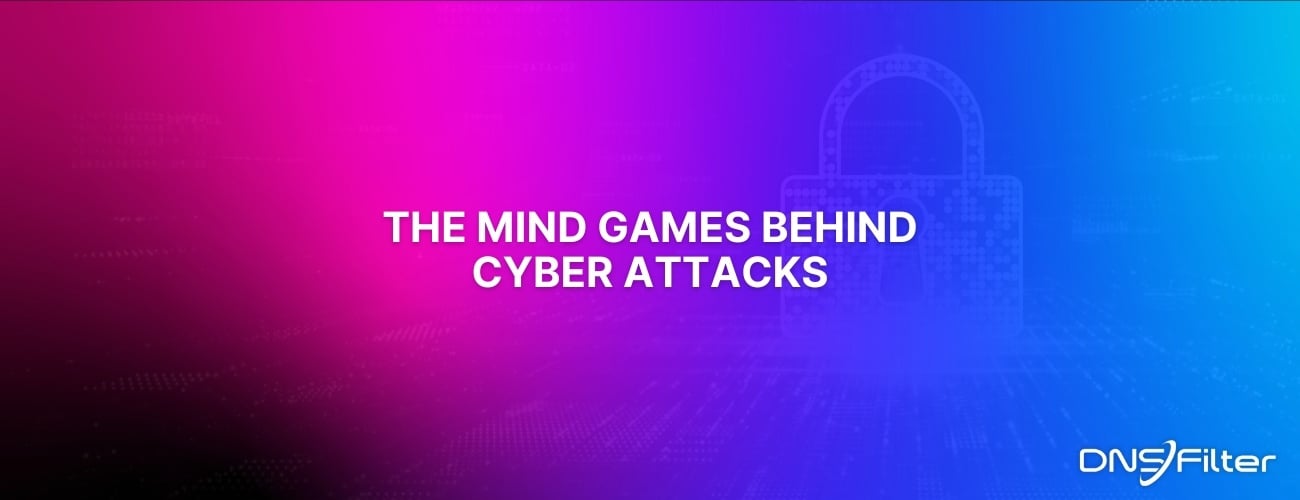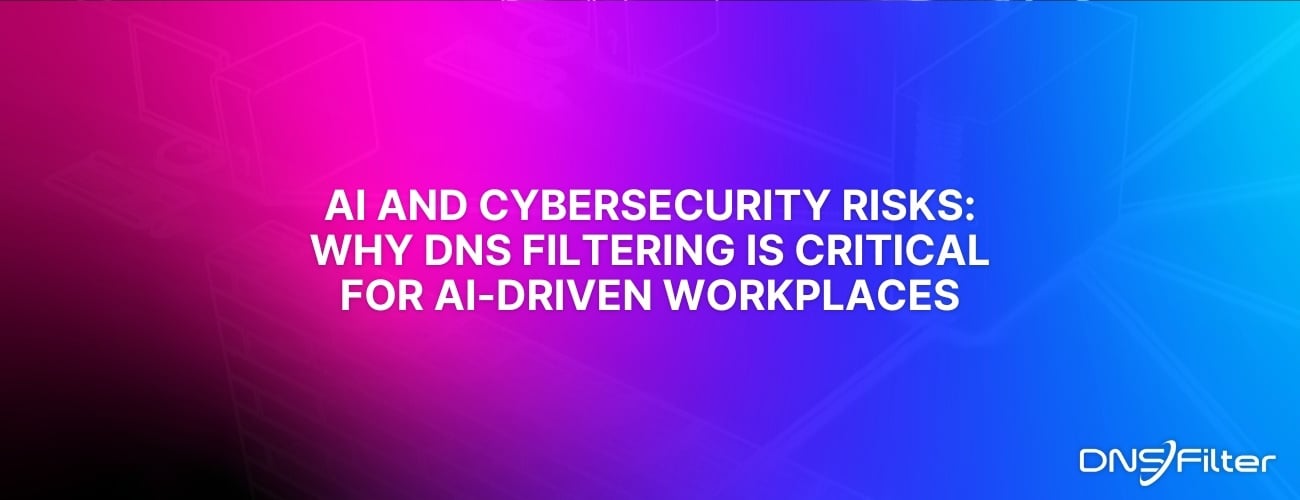Share this
AI and Cybersecurity Risks: Why DNS Filtering is Critical for AI-Driven Workplaces
by Kory Underdown on Mar 26, 2025 9:10:11 AM
Artificial intelligence is transforming business operations, automating everything from customer service to data analysis. But with these advancements come new security challenges. AI-driven cyber threats are becoming more sophisticated, enabling attackers to automate phishing campaigns, generate malware, and exfiltrate sensitive data at scale. Without proper safeguards, AI tools can unintentionally leak corporate secrets or connect to malicious external services, exposing businesses to financial and reputational damage.
DNS filtering provides a first line of defense against AI-powered threats by stopping unauthorized AI connections, blocking malicious domains, and preventing data leakage at the network level.
The Rise of AI in Cybersecurity and Its Risks
AI is not just a tool for cybersecurity defense—it’s also a weapon for attackers. Hackers are now leveraging AI to automate attacks, craft realistic phishing emails, and develop adaptive malware that traditional security tools struggle to detect.
How AI is Changing the Cyber Threat Landscape
AI-powered phishing attacks:
Attackers are indeed using AI to create more sophisticated phishing emails that mimic human behavior and include context-aware messaging. These AI-generated phishing emails have proven to be more effective at evading spam filters and tricking employees. A study from the Harvard Kennedy School and Avant Research Group found that AI-generated phishing emails achieved a 54% click-through rate compared to 12% for standard phishing emails.
AI-generated malware and zero-day exploits:
AI is being used to develop adaptive malware that can modify itself in real-time to evade detection. This self-modifying code allows the malware to continuously alter its file structure and obfuscate its code, making it extremely difficult to identify through conventional pattern-based scanning.
Data leakage and shadow AI usage:
Employee use of AI chatbots and tools without proper oversight is creating significant data exfiltration risks for companies. A recent study by CybSafe and the National Cybersecurity Alliance (NCA) found that 38% of employees share sensitive work information with AI tools without their employer's permission.
Additionally, a separate report by Cyberhaven found that the amount of sensitive data submitted to chatbots by employees increased by 156% between 2023 and 2024, with 27.4% of data submitted to chatbots now being classified as sensitive.
For a broader look at AI risks, check out DNSFilter’s article on AI cybersecurity lessons learned in 2024.
Understanding DNS Filtering in AI-Driven Workplaces
DNS filtering is a security measure that blocks access to malicious or unapproved domains at the network level. It acts as a traffic checkpoint, ensuring only legitimate queries reach their destinations while blocking harmful or unauthorized connections.
How DNS Filtering Works
At a high level, when an AI tool or application makes a request to a domain, DNS filtering:
- Scans the domain against a real-time threat database.
- Blocks access if the domain is flagged as malicious, unauthorized, or associated with AI-driven cyber threats.
- Logs the request for compliance and monitoring purposes.
Why DNS Filtering is Critical for AI-Enabled Workplaces
AI-powered workplaces are reshaping the business landscape, delivering unprecedented efficiencies and innovative solutions. However, the integration of artificial intelligence also introduces new cybersecurity challenges that demand proactive measures—particularly DNS filtering.
One critical threat DNS filtering addresses is the risk of AI-generated phishing attacks and malicious domains. As AI models regularly communicate with external servers to refine responses or gather additional data, there's potential exposure to harmful entities. DNS filtering acts as a crucial gatekeeper, ensuring AI systems only establish connections with secure, approved domains. By automatically detecting and blocking suspicious or malicious activity, DNS filtering protects your AI infrastructure from becoming compromised.
Another significant vulnerability in AI-driven workplaces is data leakage. Misconfigured AI tools can unintentionally expose sensitive or confidential information, leading to potential breaches. DNS filtering mitigates this risk by preventing unauthorized data exfiltration. It does so by automatically blocking illicit external API requests and restricting connections to non-compliant or risky AI services, effectively safeguarding your organization's sensitive data.
DNS filtering also helps manage the growing challenge of unauthorized AI use and shadow IT. Employees might unknowingly adopt unapproved or potentially dangerous AI models that bypass corporate security protocols, inadvertently creating vulnerabilities. By enforcing strict AI governance through DNS filtering, organizations ensure that employees only access authorized and sanctioned AI tools. This measure significantly reduces exposure to security threats posed by unsanctioned AI applications, reinforcing overall cybersecurity posture.
AI Threat Landscape
AI-driven technologies, including large language models, present a wide range of cybersecurity risks. While these tools improve efficiency, they also introduce new vulnerabilities that businesses must address. The table below categorizes key AI-related threats, explaining their impact and the security challenges they pose.
Security Risks Associated with AI, ChatGPT, Deep Research
| Threat | Description | Potential Impact | Example |
|
Data Confidentiality Risks |
AI models retain interactions, posing risks of sensitive data leaks. |
Unauthorized data exposure, regulatory non-compliance, intellectual property loss. |
Telecom employees unintentionally leaked proprietary source code into an AI engine without using protected accounts. |
|
Bias in Training Data |
AI models learn from biased datasets, leading to inaccurate or discriminatory responses. |
Reputational damage, unethical decision-making, compliance violations. |
AI-generated content reflecting racial or gender bias in hiring decisions. |
|
AI-Generated Phishing & Social Engineering |
AI tools create convincing phishing emails and impersonation attacks. |
Data breaches, financial fraud, identity theft. |
AI-generated email tricks employees into wiring money to a fake vendor. |
|
API Exploits |
Attackers manipulate AI APIs to extract sensitive data or gain unauthorized access. |
System compromise, unauthorized transactions, account takeover. |
Cybercriminals exploit an AI framework’s API to bypass content moderation filters. |
|
Malicious Code Generation |
AI assists in generating malware that is harder to detect. |
Increase in cyberattacks, evasion of traditional security measures. |
Hackers use AI to create polymorphic malware that adapts to security scans. |
|
Fraudulent AI Services |
Attackers develop fake AI tools to steal data or deploy malware. |
Financial fraud, unauthorized access, business disruption. |
Fake ChatGPT apps steal login credentials and credit card details. |
How to Address These Security Risks
Preventing Data Confidentiality Breaches
- Implement AI usage policies restricting employees from entering sensitive data into AI models.
- Use DNS filtering to block access to unapproved AI platforms, preventing unauthorized data entry.
Mitigating AI-Driven Phishing & Social Engineering
- Deploy DNS-based threat intelligence to detect AI-generated phishing domains in real time.
- Train employees on AI-enabled phishing risks to reduce susceptibility to scams.
Defending Against API Exploits & Malicious Code Generation
- Monitor API requests and DNS traffic for unusual AI-related queries.
- Use AI-driven anomaly detection to identify suspicious API interactions.
Blocking Fraudulent AI Services
- Allow trusted AI applications while blocking malicious AI services via DNS filtering.
- Ensure employees only download AI tools from verified sources.
How DNS Filtering Protects Against AI Security Risks
How DNS Filtering Mitigates AI-Generated Cyber Threats
- Blocks AI-generated phishing and malicious domains
AI enables attackers to create thousands of unique phishing domains daily, bypassing traditional static blocklists. A security team using DNSFilter’s AI-driven threat intelligence detected and blocked a new AI-generated phishing domain in under 60 seconds, preventing an enterprise-wide attack. - Prevents data leakage from AI chatbots
Many businesses use AI-powered assistants that process sensitive internal data. DNS filtering prevents unapproved AI platforms from sending requests to unknown external servers. - Detects anomalous AI traffic
AI-enhanced DNS filtering solutions monitor patterns in real-time to detect unusual data requests, a sign of potential exfiltration or misuse.
Implementing DNS Filtering for AI Security
How can organizations implement DNS filtering for AI security?
1. Establish AI-specific domain policies: Allowing trusted AI tools ensures only authorized AI services are accessible within the corporate environment
2. Use AI-powered DNS threat intelligence: AI-driven threat detection improves DNS filtering accuracy by identifying new malicious AI-generated domains before they cause harm.
3. Integrate DNS filtering with Zero Trust security: Zero Trust principles require continuous verification of AI-related DNS queries, preventing unauthorized AI models from gaining access.
4. Monitor and log AI-related DNS traffic: Continuous DNS monitoring helps security teams detect and respond to AI-related threats before they escalate.
Secure Your AI-Driven Workplaces with DNS Filtering
AI’s growing role in business demands stronger cybersecurity protections. DNS filtering provides a scalable, proactive solution to counter AI-driven cyber threats.
- Protect your organization from AI-generated cyber risks
- Ensure compliance with AI governance policies through DNS security
- Try DNSFilter’s AI-powered DNS security today
Share this
 Artificial Intelligence in Cybersecurity
Artificial Intelligence in Cybersecurity
The term “artificial intelligence (AI)” was first coined in 1956. While progress stalled for many years, we can thank IBM for sparking real interest in AI as viable technology: First in 1997 when the computer Deep Blue defeated a chess champion and again in 2011 when Watson won Jeopardy!
 The Mind Games Behind Cyber Attacks
The Mind Games Behind Cyber Attacks
Hackers have long understood that the most sophisticated firewall is no match for a well-placed psychological trick. While many focus on the technical prowess of cybercriminals, the real magic often lies in their ability to manipulate human behavior. By exploiting our natural tendencies and cognitive biases, hackers can slip past even the most robust security systems. It's not just about cracking codes; it's about cracking the human psyche.
 AI and Cybersecurity Risks: Why DNS Filtering is Critical for AI-Driven Workplaces
AI and Cybersecurity Risks: Why DNS Filtering is Critical for AI-Driven Workplaces
Artificial intelligence is transforming business operations, automating everything from customer service to data analysis. But with these advancements come new security challenges. AI-driven cyber threats are becoming more sophisticated, enabling attackers to automate phishing campaigns, generate malware, and exfiltrate sensitive data at scale. Without proper safeguards, AI tools can unintentionally leak corporate secrets or connect to malicious ...


